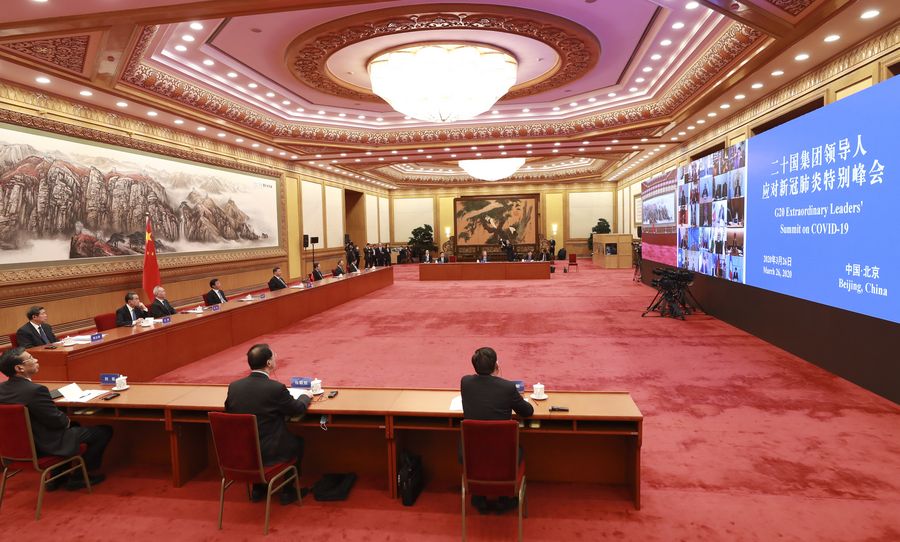
Chinese President Xi Jinping attends the G20 Extraordinary Virtual Leaders' Summit on COVID-19 via video link in Beijing, capital of China, March 26, 2020. (Xinhua/Pang Xinglei)
The Chinese word for “crisis” is composed of two characters that respectively signify “danger” and “opportunity.” The coronavirus pandemic has indeed alerted the world to the “danger” lurking amongst us. But the G20 Extraordinary Leaders’ Summit on COVID-19 of March 26 represented a real "opportunity” to advance a coordinated global response to the outbreak, and to create also a new paradigm for humankind to overcome the drawbacks and dangers implied by the prevailing geopolitical status quo.
Saudi King Salman bin Abdulaziz Al Saud hosted the summit, and Xi Jinping was among the leaders of other G20 member and guest countries and relevant international organizations that took part. Given that China was the first country to confront and overcome the virus, the country has been proactive in assisting, through advice, personnel, and critical medical supplies, the 80 or more countries now battling COVID-19.
In his speech at the summit, titled, “Working Together to Defeat the COVID-19 Outbreak,” President Xi underlined the importance for the international community of acting with unity and working together in a collective response to the outbreak, and indicated China’s readiness to share its experience and measures in containing the sudden outbreak in Hubei Province. Although countries have been slow to bring these measures — namely, quarantine, mass testing, and social distancing — into effect, there is now a general consensus that they are the most effective.
President Xi’s proposal to follow up the G20 summit with an immediate meeting of G20 health ministers was crucial to consolidating a successful global strategy to tame the raging pandemic. Also critical is President Xi’s call for special assistance and support for developing countries whose health care systems lag behind those in the developed world.
A meeting on international public health security, which President Xi broached in his speech, may also propel the establishment of a regional emergency liaison that enables a quicker response to public health emergencies.
Most importantly, the G20 Summit provided the opportunity for an exchange between President Trump and President Xi, followed up the same day by a cordial phone conversation between the two leaders in which both agreed on the need for greater cooperation.
The final point President Xi raised was that of the next crisis looming on the horizon — the imminent danger of an international financial collapse. In light of disruptions to production and supply chains across the globe, President Xi urged G20 leaders to take measures to maintain the continuity of supply chains of medical supplies and other vital necessities stable. Xi moreover called for rigorous financial regulation to keep exchange rates basically stable.
Although we must make efforts to maintain the trade and production mechanism during this crisis, we should not bail out speculators. The demise of much of the outstanding, and largely speculative, debt represented by Wall Street, gives the world a chance to rebuild our financial system on a different basis whereon the general welfare of the people, rather than “shareholder value” is paramount.
As the economy and public health are inextricably intertwined, more attention should be placed on Helga Zepp-LaRouche’s recent call for a Crash Bio-Defense Initiative, taking up a proposal that her husband, economist and statesman, Lyndon LaRouche proposed way back in 1974 in the midst of the AIDS epidemic. In 2001, Lyndon LaRouche wrote: “National biological defense means, chiefly, those measures of sanitation which are essential to improving and defending the life-expectancies and well-being of the population as a whole.” In preserving the health of the world, we must create development for all.
All in all, the “opportunity” that this terrible crisis offers is the chance to change the way the world is structured — between the haves and the have-nots, and to work towards giving everyone a level of modern living that incorporates equal standards of healthcare.
_______________
WILLIAM JONES is the Washington Bureau Chief of the U.S. publication Executive Intelligence Review.